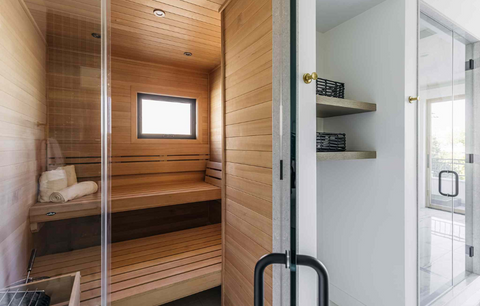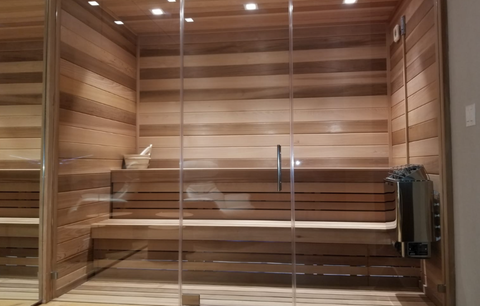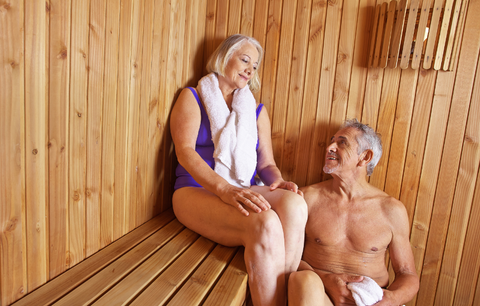Picture this: you’re in your backyard, taking in the fresh air and sunbathing in the sun. You think to yourself, “This is bliss!” Indeed it is! Now imagine adding a premium sauna to the mix. You’ve just taken your outdoor experience to a spectacular new health and wellness level.
A premium sauna is not your regular run-of-the-mill sweatbox but a space where you can literally melt your stress away. An oasis for soothing your body and soul. A haven for renewal, recharging, and numerous health benefits.
Some of the benefits of traditional Finnish and infrared saunas include improved heart health, better endurance for physical activities, faster recovery from exercise sores, deeper and longer sleep, improved lung function, reduced odds of catching a cold, flu, dementia, Alzheimer’s disease, and more.
Below, we explore 13 remarkable health and wellness benefits and the delightful world of premium saunas. We’ll also answer a few of your important and frequently asked questions regarding saunas.
1. Saunas improves your cardiovascular health
According to the Centers for Disease Control and Prevention, 1 in 5 deaths in the United States is linked to a heart-related disease. Research has, however, shown that frequent sauna bathing can help you reduce the risk of death from any heart-related illness.
One study tracked 2,316 participants for 20 years and found that those with a higher frequency of sauna baths per week (four to seven) had lower death rates from heart disease and stroke than those who sauna bathed infrequently.
The researcher, however, noted that such a benefit is possible due to the unique characteristics of traditional saunas. As such, users of steam baths and hot tubs may not experience such an advantage.

2. Improves your cardiovascular respiratory fitness level
Cardiovascular respiratory fitness (CRF) level is a term scientists use to describe how well your body can deliver oxygen to your muscles and organs during physical activity. The higher your CRF, the lesser your risk of
A sauna session after each exercise improves your CRF, thus increasing your stamina and endurance for intense physical activities.
Individuals with a higher CRF are also less likely to develop high blood pressure than people with lower CRF levels. Another study found that older adults with a higher CRF performed better at tasks requiring multitasking and better cognitive performance.
3. Can improve your total cholesterol level
Too much cholesterol in your blood can put you at risk of developing heart disease. Cardiologists believe reducing your total cholesterol by just 10% can lower that risk by 30%. Sweating can help with this.
Both physical exercise and regular sauna sessions can help on their own, but nothing beats combining the two. A sauna session after exercise can increase the amount of high-density lipoprotein (HDP) cholesterol and reduce low-density lipoprotein (LDL) cholesterol in your blood. HDL is good, and LDL is bad for you.
One research study subjected 90 participants to seven steam sauna baths every alternate day. The results showed significantly increased HDL in all the participants and weight reduction after the seventh session.
4. Sauna is great for post-workout recovery
There’s a risk of muscle tears when you work out intensely. These tears will heal eventually. This tear and healing toughens the muscles and makes them stronger.
That’s why you experience muscle tension and soreness after each intense workout. Not healing properly between each workout session can limit your performance.
You can heal these torn muscles quickly with the heat from saunas. Saunas increase your core body temperature, which expands your blood vessels and causes oxygen- and nutrient-rich blood to circulate to the damaged muscles more readily, which helps them heal quicker.
So you can build your strength and power much quicker without much delay between sessions.

5. Reduced risks of dementia and Alzheimer disease
The same study we cited above that tracked over 2,000 participants aged 42 to 60 years for 20 years found that saunas also have neurocognitive benefits.
The participants who had four to seven sauna sessions every week had a 66% and 65% lower risk of dementia and Alzheimer’s disease, respectively, compared to those who had only a single session per week.
Want to prevent neurodegenerative diseases in old age? Continual sauna sessions per week might be one of the habits you must take up.
6. Saunas can help you reduce stress
Stress is a slow and silent killer. It can wreak havoc on many body functions and may lead to other diseases such as hypertension, insulin resistance, and obesity. This is especially true for those in high-stress occupations like first responders, police officers, and firefighters.
Ordinarily, a sauna is a great place to relax and meditate, but it’s more than that. The sauna’s warmth can have a positive effect on the level of stress markers in your body, like β-endorphin and cortisol. Too much cortisol in your blood indicates that you’re stressed.
Spending time in a sauna stimulates muscle relaxation and lessens the cortisol level in the blood, thus lowering your stress levels.
7. Regular sauna bathing can improve lung function
Regular sauna sessions have been strongly linked to preventing and soothing pulmonary diseases.
A study of a group with obstructive pulmonary disease found extended sauna exposure led to improved lung function.
Some of the metrics that improved include vital capacity and volume, and vital capacity and volume. In simpler terms, the participants had healthier lungs and could breathe better.
Another study found that regular sauna bathing of at least four sessions was associated with a lower risk of respiratory diseases such as asthma and pneumonia.
8. Sauna may reduce how often you catch cold
The common cold and flu seem harmless, but anyone who has ever caught a cold knows it is a productivity killer.
The CDC estimates that flu outbreaks in the United States cost about $3.2 billion in hospitalization alone and approximately $8 billion in indirect effects like lost days at work.
Those who sauna bathe regularly don’t really have to worry, though, according to a study of 50 participants. Half the participants received regular sauna sessions, while the other group did not.
Six months of data showed that the incidence of cold in the sauna group was half that of the control group.
While there’s no proof yet that sauna bathing strengthens your immune system, the lower incidence in the sauna group is no coincidence.
9. Saunas can help you manage and improve pain
Whether it’s regular or tension headaches or pain from musculoskeletal disorders, regular traditional or infrared sauna sessions can help.
Multiple studies show that saunas can help improve pain from musculoskeletal disorders like rheumatic diseases and fibromyalgia.
A random controlled study of 37 subjects with chronic tension-type headaches also found that the group exposed to regular sauna bathing for eight weeks reported a significant reduction in headache intensity. They defined this type of headache as occurring more than 15 days per month.
10. Regular sauna bathing may help protect your skin from dryness
A controlled study examining the impact of frequent sauna sessions on skin physiology split participants into two groups. One group had a regular sauna experience, and the others did not.
According to the authors, the layer of the skin that helps retain water was much better in the sauna group. Similarly, the authors observed lower casual skin sebum (oily) content on the volunteers’ foreheads.
The authors concluded that “the present data suggest a protective effect of regular sauna on skin physiology, especially surface pH and stratum corneum water-holding capacity.”
The heat and profuse sweating also help dispose of dead skin cells and other wastes like carbon dioxide and sodium, leaving your pores open and your skin fresh.
11. Improved quality of life for older citizens
Saunas offer many benefits to everyone, but it’s even more important to older citizens who are less mobile and cannot enjoy the fruits of physical activity.
A study of 524 adults aged 80-89 strongly associated consistent sauna sessions with a higher quality of life. The sauna users enjoyed improved social functioning, better physical condition, increased vitality, and better general health than the non-users.
It’s important to note that many of these sauna user volunteers had reduced the frequency of their sessions over the years, yet they still outperformed the non-sauna users substantially.
12. Strengthens social bond with others

A time in the Sauna is a special way to bond with others, especially those close to you. A sauna can serve as a sanctuary away from the distractions of today.
No mobile phones. No gadgets.
You can use that moment for frank and thoughtful conversations, steamy gossip, or use the moment for joint silent contemplation. Either way, sauna bathing is a therapeutic way to spend time with the people you care about or soon-to-be friends.
13. Regular sauna use helps you sleep better
The heat from saunas helps your body produce melatonin, the hormone that regulates our sleep-wake cycle. The initial rise in body temperature and the subsequent cooling down jumpstarts this production.
As we’ve also shown above, saunas help you relax (physically and mentally) and ease tension in your body. These twin factors help you fall asleep quicker and enjoy a longer and deeper sleep.
FAQs about saunas
How long do you need to use the sauna to see the benefits?
Most research studies on the benefits of saunas show that people who experienced four to seven sessions per week experienced the most benefits.
In terms of the time you should spend in one, the experts recommend between 15 and 20 minutes. However, take it slow at the beginning if you’re new to sauna bathing. Five to ten minutes for the first few weeks should suffice.
What is the ideal time of the day to use a sauna?
There is really no ideal time to use a sauna. The time you use a sauna will depend on your primary goal(s) and schedule.
For example, a person who wants to sleep better is better served by sauna bathing at night. Similarly, an athlete would hop into a sauna immediately after their workout, irrespective of the time.
Can you use a sauna on an empty stomach?
You can use a sauna on an empty stomach. However, it’s preferable to eat something light before your session. You must, however, ensure that you’re well-hydrated before and after the session. No drinking while bathing, though.
Takeaway: Enjoy premium sauna benefits beyond hot air
Having a premium sauna in your backyard extends far beyond enjoying a sweaty pastime. It’s a gateway to numerous benefits that enhance your physical health, mental well-being, and overall quality of life.
From stress relief to cardiovascular health, better sleep, and even the quest for clearer skin, having a premium sauna is a bold step into a harmonious synergy of relaxation and wellness.
So, whether you’re seeking a quiet escape at home, a sanctuary for physical recovery, or a fountain for rejuvenation in your backyard, a premium sauna is the answer.
Want to learn more about premium saunas? Read our Traditional Vs Infrared Sauna Comparison.




